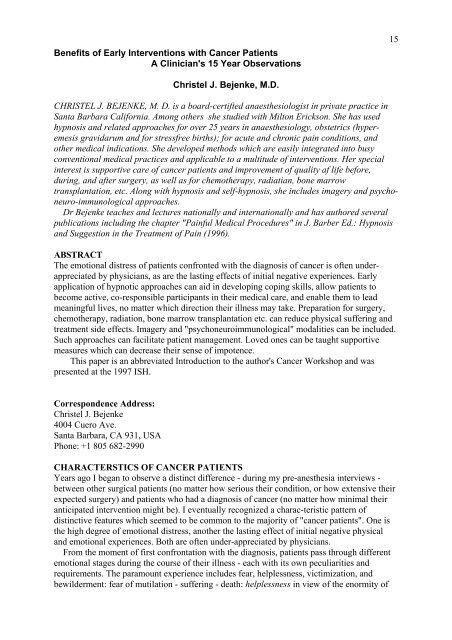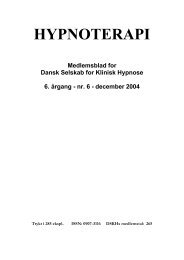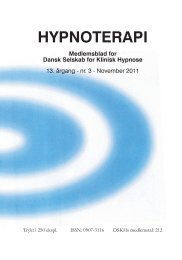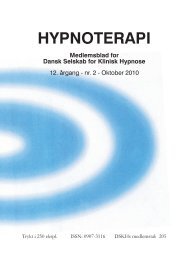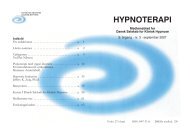HYPNOTERAPl - Dansk Selskab for Klinisk Hypnose
HYPNOTERAPl - Dansk Selskab for Klinisk Hypnose
HYPNOTERAPl - Dansk Selskab for Klinisk Hypnose
Create successful ePaper yourself
Turn your PDF publications into a flip-book with our unique Google optimized e-Paper software.
Benefits of Early Interventions with Cancer Patients<br />
A Clinician's 15 Year Observations<br />
Christel J. Bejenke, M.D.<br />
CHRISTEL J. BEJENKE, M. D. is a board-certifted anaesthesiologist in private practice in<br />
Santa Barbara Cali<strong>for</strong>nia. Among others she studied with Milton Erickson. She has used<br />
hypnosis and related approaches <strong>for</strong> over 25 years in anaesthesiology, obstetrics (hyperemesis<br />
gravidarum and <strong>for</strong> stressfree births); <strong>for</strong> acute and chronic pain conditions, and<br />
other medical indications. She developed methods which are easily integrated into busy<br />
conventional medical practices and applicable to a multitude of interventions. Her special<br />
interest is supportive care of cancer patients and improvement of quality af life be<strong>for</strong>e,<br />
during, and after surgery, as well as <strong>for</strong> chemotherapy, radiatian, bone marrow<br />
transplantation, etc. Along with hypnosis and self-hypnosis, she includes imagery and psychoneuro-immunological<br />
approaches.<br />
Dr Bejenke teaches and lectures nationally and internationally and has authored several<br />
publications including the chapter "Painful Medical Procedures" in J. Barber Ed.: Hypnosis<br />
and Suggestion in the Treatment of Pain (1996).<br />
ABSTRACT<br />
The emotional distress of patients confronted with the diagnosis of cancer is often underappreciated<br />
by physicians, as are the lasting effects of initial negative experiences. Early<br />
application of hypnotic approaches can aid in developing coping skills, allow patients to<br />
become active, co-responsible participants in their medical care, and enable them to lead<br />
meaningful lives, no matter which direction their illness may take. Preparation <strong>for</strong> surgery,<br />
chemotherapy, radiation, bone marrow transplantation etc. can reduce physical suffering and<br />
treatment side effects. Imagery and "psychoneuroimmunological" modalities can be included.<br />
Such approaches can facilitate patient management. Loved ones can be taught supportive<br />
measures which can decrease their sense of impotence.<br />
This paper is an abbreviated Introduction to the author's Cancer Workshop and was<br />
presented at the 1997 ISH.<br />
Correspondence Address:<br />
Christel J. Bejenke<br />
4004 Cuero Ave.<br />
Santa Barbara, CA 931, USA<br />
Phone: +1 805 682-2990<br />
CHARACTERSTICS OF CANCER PATIENTS<br />
Years ago I began to observe a distinct difference - during my pre-anesthesia interviews -<br />
between other surgical patients (no matter how serious their condition, or how extensive their<br />
expected surgery) and patients who had a diagnosis of cancer (no matter how minimal their<br />
anticipated intervention might be). I eventually recognized a charac-teristic pattern of<br />
distinctive features which seemed to be common to the majority of "cancer patients". One is<br />
the high degree of emotional distress, another the lasting effect of initial negative physical<br />
and emotional experiences. Both are often under-appreciated by physicians.<br />
From the moment of first confrontation with the diagnosis, patients pass through different<br />
emotional stages during the course of their illness - each with its own peculiarities and<br />
requirements. The paramount experience includes fear, helplessness, victimization, and<br />
bewilderment: fear of mutilation - suffering - death: helplessness in view of the enormity of<br />
15


